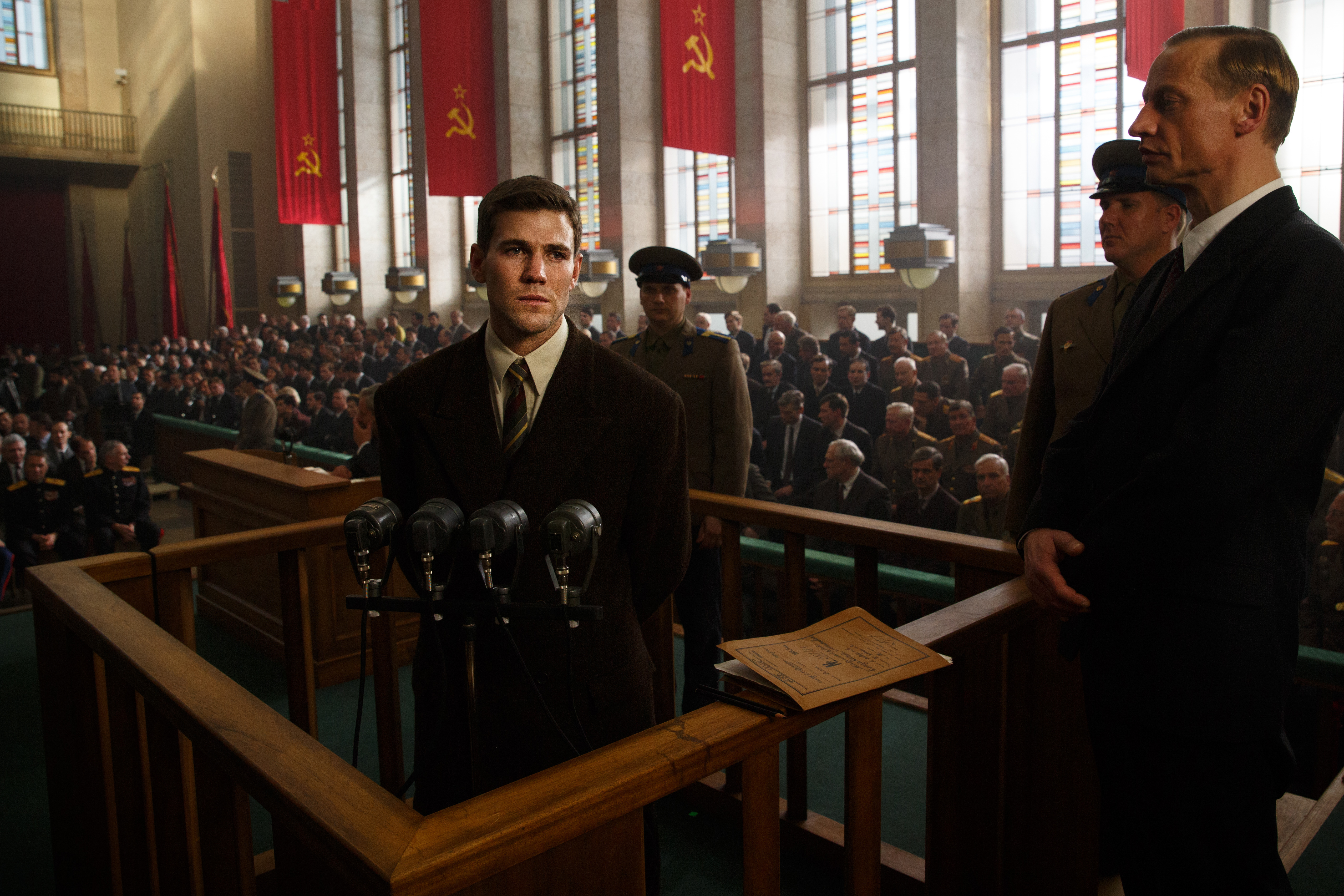When did you get the call?
The call came from my agent. Originally I went for the part of Donovan’s (Tom Hanks) assistant but because of the shape I was in at the time, I was told that I looked more like a linebacker than a clerk in a law office. I didn’t hear anything more about it but then all of a sudden my agent called and said we had an offer to play the pilot, Francis Gary Powers. Of course, I was over the moon and I did my usual tradition of jumping in a pool with all my clothes on!
How did it feel to play Powers? Did you feel like you were portraying an American hero or someone who’s been perhaps been a bit misjudged over time? A lot has been said about how he gave secrets too easily to the Soviets, for example.
He’s certainly somebody who’s been misjudged and definitely an American hero. This is somebody who spent three years in a KGB prison. The only information Powers gave to the Soviets was information about the plane that he thought they could gather on their own anyway. He was very worried that one of the other pilots in his unit would be shot down because of information he gave. He played everything very close to his chest once he was captured.
I didn’t initially know who Powers was and that’s a shame as he’s somebody I now hold in the highest regard for his sacrifices for this country and the freedom we get to enjoy everyday. Once I got the role, I started talking to my older relatives, particularly my grandmother, who remembers the day it happened. She knew exactly who Powers was and you could tell she had questioned his motives. When Powers returned to the USA, the Soviets had released so much propaganda about him while he was in prison – that he had been learning Russian and was thinking about staying in the Soviet Union because he had enjoyed his time there so much. But that couldn’t have been further from the truth. The only communication he did have was through his Latvian cellmate, who he always thought might have been a plant by the KGB. He knew English and could talk to and translate for Powers. That was the extent of his social life while he was in the Soviet Union. He wanted nothing more than to get home and he is quoted as saying on the bridge that if something went wrong, he’s just to make a run for it. He didn’t care if he was shot.

What was the best and also the most difficult scene to film?
The most difficult was probably the plane crash. It took three days and we’d set up an incredible rig in an airport so I was hanging from the rafters and basically being a puppet. I was spinning around with 70-mile-per-hour fans pointing at me with stuntmen all around. It was difficult because we were trying to re-enact a freefall from 70,000 feet in the air. Trying to do that without actually crashing a plane is extremely difficult.
Our wonderful production team has done an incredible job taking that bridge (Glienicke Bridge in Berlin) into the condition it was in during the time. We used the same snow as in Harry Potter and it was incredibly realistic. We had barbed wire, guard towers and it was so cold. It was a lot of fun being on that set.
How did you get into his mind set and what he was going through? How did you research him and get into the part? I’ve heard that you locked yourself in a prison cell in a Stasi prison to get in the moment?
Of course I had no idea what it was actually like to be in solitary confinement for close to 90 days or three years in a KGB prison half way around the world. But you know, I’ve been lonely, so I tried to adapt those raw emotions. I asked the production team to leave me in the cell and lock the door when we weren’t shooting. When you’re locked in, it’s a very claustrophobic environment. It’s the quiet that really gets to you. We live in a world of noise – music, the buzz of the city, dogs barking – but in there there’s no sound except the sound that you make. There’s no echo, so any sound you do make sounds stale and off-putting.

Did you get to speak to Francis Gary Powers Jr about his father?
I spent quite a bit of time with him and one of the best things he did for me was give me his audiotapes. They had been recorded in the late 1960s and early 1970s when Powers was speaking to an interviewer about his experience. I don’t think there’s any greater tool other than meeting the man in person. Hearing the voice of the man you’re trying to portray, I couldn’t ask for better than that.
Your IMDB bio states that you’re an ‘avid fan of wearing sunglasses at night’. Is this true?
I have no idea! Maybe someone wrote that as a joke? I think that anyone who wears sunglasses at night should have a white cane in front of you or a sign saying ‘douchebag’!
Bridge Of Spies is available on Digital HD on 20 March and Blu-ray™ and DVD on 28 March, courtesy of 20th Century Fox Home Entertainment.

For more on 20th century history pick up the new issue of All About History here or subscribe now and save 25% off the cover price.
